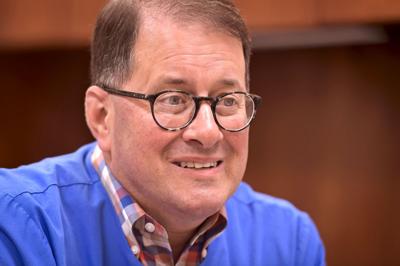It’s been 30 years since Dr. Peter Ross opened a 750-square-foot dental practice in Manheim Township.
Since then the Pittsburgh native has seen thousands of patients in his adopted hometown, while expanding Lancaster Pediatric Dental Associates three times.
Today, the 63-year-old Ross presides over a 7,100-square-foot office at 1875 Lititz Pike with 24 employees, including three other dentists.
Ross, who did his dental residency at Children’s Hospital of Pittsburgh, was recently installed as president of the Pennsylvania Academy of Pediatric Dentistry.
In a recent interview at his office, Ross discussed the changes he’s seen in dentistry, the business side of the being a dentist, and the movies he watches every day with his young patients.
Why did you start a practice in Lancaster?
I did a market analysis on the area, on whether or not they needed another pediatric dentist. Lo and behold it looked like it might work.
Did you think of going in with someone else at the beginning?
Not really. It was either stay in academics or set out and start my own practice. Every place I looked, it was to start a practice. Today, the three associates I have had no intention of doing that at all.
What we’ve seen more in dentistry is group practices instead of solo practitioners. From a cost-effective standpoint, it’s better to go with a group than to go solo.
How much school debt did you have at first?
When I came out of dental school, I had $15,000 in debt. Now, you have to add a zero to that, at least. It’s scary how much debt they incur.
How much did you know about the business of dentistry when you started out?
None.
So how did you handle the business side?
I got the best available advice I could at the time about practice management.
I learned about taxes. The first year in practice, I got a huge refund; the second year, I gave it back. I didn’t understand the process.
What guided your decisions?
I made sure that before I did anything different there was evidence it was effective.
When the digital X-ray came out, I didn’t jump at it right away. It had a lot of good things about it that were attractive to pediatric dentistry — less radiation, better pictures — but the technology wasn’t quite there, and it was really expensive. I waited a few years, and it got better.
Also, lasers in dentistry have a limited use right now. They may have a place, but it doesn’t make a lot of sense from a business standpoint to put a sealant on a tooth with a laser that costs $50,000.
How has dentistry changed?
What’s changed drastically recently is that dentistry has become more evidence-based, based on research. In the last 10 to 15 years, there’s more research that validates how we practice and how we should practice.
What about insurance?
Insurance has opened up the practice of dentistry and made it more accessible to everybody, which is a good thing. But with that availability, it became more difficult to practice because there are more restrictions, more control from the insurance companies.
Did you take insurance at first?
Not really. It wasn’t as prevalent 30 years ago. I didn’t begin to accept insurance until maybe 10 or 15 years ago.
Could you have a practice today that didn’t take insurance?
A lot of people do, but I think they struggle. Especially with 2007-2008, the recession, the average dentist probably lost anywhere from 14 to 18 percent.
How did you avoid taking a hit during that recession?
We started to participate with more insurances, and that helped. We saw holes in the schedule, so we looked at insurances to participate with and negotiated our fee schedule for a specialist. I didn’t learn that in dental school.
What’s challenging about working with children?
What we see is that children bring a lot of things to the table. It could be anxiety over what we’re going to do or their prior experiences. My challenge always has been to bring this youngster around so they can accept a lifetime of dentistry.
How do you help children relax?
Kids watch movies. And you may say that is entertainment but, quite frankly, we use it with treatment.
I’ve had 2-years-olds who maybe wouldn’t be able to sit down in a dental chair who do treatment because we distracted them and took their mind off what we were doing. They were able to accomplish their treatment, which is a huge thing.
What movies do you show?
We show “Frozen” a lot, “Despicable Me.” “Ice Age” is a good one. Now that the holidays are coming, we’ll show “Polar Express”; we’ll show “Frosty” movies.
I love it when the Amish kids come. They don’t watch television, of course, so they are just totally glued to what is going on with the movie, and that is a great tool — as long as it’s OK with the parent, which it usually is.
Do you tell jokes?
Not really. What I do best is try to quote the movies. I know them all by heart. I try to make some kind of common ground with that youngster.
Is it hard to find employees?
They’re easy to find sometimes, but harder to fit because we’re a specialty practice. A person has to have some special skills and experience, and it’s not innate. From that standpoint, it’s been more difficult, but I think there’s a lot of dental auxiliary people available.


 CHAD UMBLE | Staff Writer
CHAD UMBLE | Staff Writer

